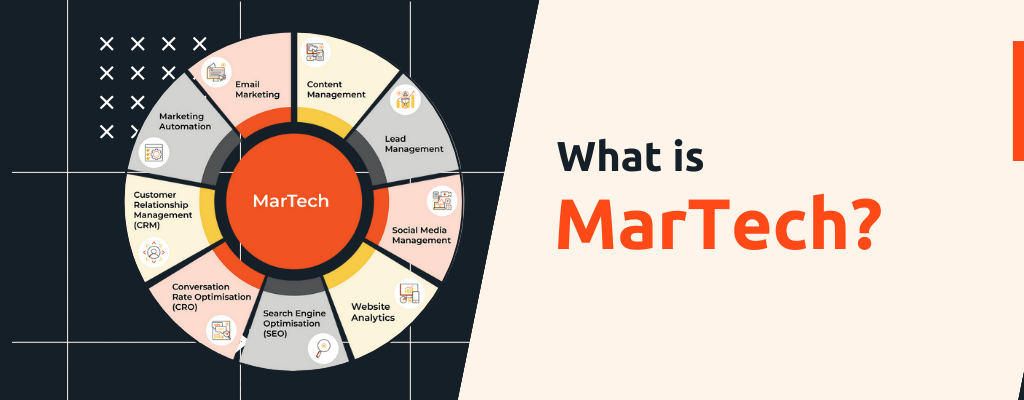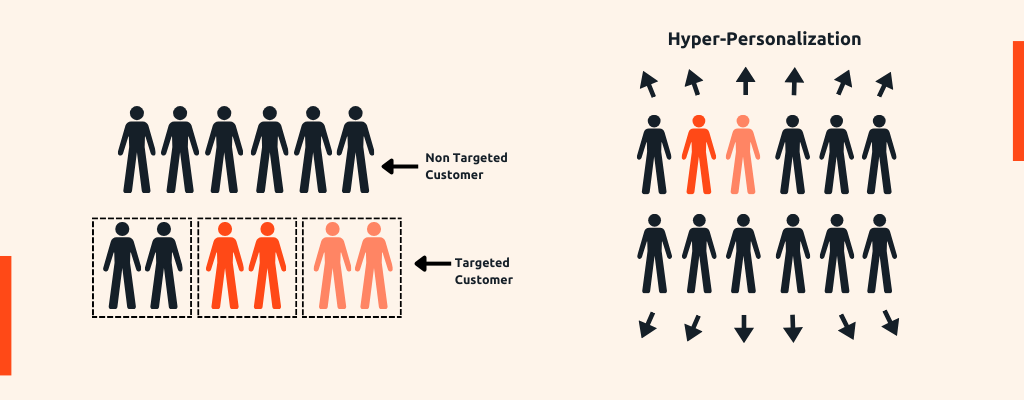Table of Contents
- 1. Build a Strong Brand Identity
- 2.Optimize Your Social Media Profile Bios and Links
- 3. Consistently Deliver High-Value Content
- 4. Strategically Use Your Hashtags
- 5. Actively Engage with Your Social Media Audience
- 6. Enhance Your Customer Service Efforts
- 7. Forge Partnerships with Complementary Brands
- 8. Harness the Power of Influencers
- 9. Use Strategic Paid Advertising for Optimal Results
- 10. Evaluate Metrics and Fine-Tune Your Strategies
The Marketing landscape is continuously evolving with the emergence of new technologies and transformations, shifting consumer behaviour and presenting marketers with both challenges and benefits. As we are saying bye to 2023 and stepping into 2024, several exciting trends are poised to reshape how businesses connect with their audiences. So as marketers, you should keep an eye on the MarTech trends that shape the industry to stay ahead of the game.
In 2024 by embracing AI-powered personalization, exploring immersive technologies, and leveraging data-driven insights, businesses can unlock unprecedented opportunities to connect with their customers to achieve sustainable growth in the industry. Can’t wait to see what future Marketing technology (MarTech) awaits for you. No worries in this blog post we will explore what is Martech, its importance, MarTech trends and tools that shape the market.
What is Marketing Technology (MarTech)?
Marketing Technology is also referred to as “MarTech, where a wide range of software and tools help marketers achieve their marketing goals and objectives. It enables marketers to automate the most time-consuming tasks through the software and tools and free up their time to focus more on high-priority activities.
MarTech allows marketers to plan, execute, and measure campaigns and activities. The primary goal of martech is to improve the efficiency and effectiveness of marketing efforts, allowing businesses to better understand their audiences, optimize campaigns, and ultimately achieve their marketing objectives.
Why Marketing Technology is Important to Your Business?
MarTech plays a crucial role in the current business landscape, allowing marketers to manage their marketing campaigns more efficiently and effectively. Here are some highlights of why MarTech matters for your organization.
- Improved Customer Insights
MarTech helps businesses with advanced data and insights about their customers. Marketing Technology tools like Customer Relationship Management (CRM) systems, and analytical and social media platforms help businesses to collect and analyze customer data to gain an understanding of customer behaviour, preferences and needs which helps them to create a personalized marketing campaign.
- Competitive Advantage
Businesses that are ready to embrace the technology within their marketing efforts often gain a competitive advantage over their competitors. Staying updated with MarTech trends like artificial intelligence, machine learning, chatbots, or data analytics allows businesses to innovate, adapt to changing consumer behaviours, and remain ahead of competitors in the dynamic digital landscape.
- Data-Driven Decision Making
Marketing Technology allows marketers to make data-driven decisions by analyzing the high-level data related to customer behaviour, campaign performance, and market trends. This data-driven approach helps in making informed decisions, optimizing strategies, and maximizing return on investment (ROI).
- Personalized and Targeted Marketing Campaigns
MarTech enables to craft and deliver personalized targeted marketing campaigns to a specific audience segment. It allows marketers to tailor their messages and campaigns to to specific demographics, interests, or behaviors. It also facilitates personalization by understanding customer behaviour, and preferences which helps them to enhance their customer experience, increasing engagement and building strong customer loyalty.
- Omnichannel Marketing
Martech tools open the door for cohesive and consistent customer experience through multiple channels and devices from websites, mobile apps, social media, email, and offline channels. This integration ensures that customer enjoys a great experience regardless of the channel they engage with. It will also help to boost the brand recognition and customer satisfaction.
Top Six Martech Trends to watch in 2024 and beyond
Here we have broken down the six major MarTech trends that gonna transform the marketing campaigns in 2024;
- Greater Investment in Analytics
Don’t deny integrating an easy-to-use analytics solution within your MarTech stack. These tools will help marketers to gain deep insights into your marketing campaigns from analyzing customer behaviours, and conversion rates to making informed decisions.
Indeed researchers predicted a 61 percent increase in marketing analytics over the next three years. It’s quite a huge amount, as a marketer don’t miss to invest in these analytical tools to transform your perspective on your business.
What are the benefits of these Marketing Analytics tools?
- Enable real-time reports on the marketing campaign performance across all the channels.
- Data-driven decision-making through actionable insights that pave the way for improving lead generation.
- Deep understanding of customer preferences and behaviours
- Using predictive analytics to be more proactive
- Integrating Artificial intelligence and Machine learning within Marketing Automation
The major MarTech trend for 2024 is Artificial Intelligence and Machine Learning where AI is growing and playing a crucial role in every aspect of a business. It automates the core marketing activities from lead generation, behavioural analysis, and personalization to customer relationship management (CRM). Machine learning (ML), natural language processing (NLP), large language models (LLM), and deep learning are revolutionizing the way businesses gain insights about their customers and process these insights to make strategic decisions.
Let’s examine how the Large Language model dominates the MarTech industry. LLM transforms the way businesses communicate with their data. The large Language model allows interactions in plain English, regardless of traditional analysis methods which require a quite knowledge of SQL and other database languages. So through these marketers can analyze complex data sets and can get valuable real time insights.
As per the research study, 91% of businesses already adopted Artificial Intelligence into their Marketing efforts. Still, if you didn’t embrace AI within your marketing efforts now it’s time to integrate it within your efforts.
- Growth of Hyper-Personalization
In 2024. Hyper-Personalization will become an inevitable part of your marketing campaign to deliver excellent customer service. Hyper Personalization goes a step beyond traditional personalization where customers are segmented based on broader categories such as demographics, address, and name. So What’s hyper-personalization? it’s a strategy that delivers individual content to customers by understanding every individual’s preferences, behaviours and needs. It can be done through real-time data and advanced data analytics. Hyper-Personalization treats its customers as an individual rather than a mass crowd.
For example, instead of sending emails to all subscribers in the Morning, hyper-personalization tailors the emails and sends them at optimal time for each subscriber based on their past behaviour or else you can personalize your website’s home page with the products or content most liked by your customers based on the past behaviour them
Expanding Avenues for Personalization,
- Custom video messages
- Personalized Emails
- Product recommendations
- Social Media
Since personalisation is vital for businesses, marketers who don’t focus on tools to assist them in personalization will be kicked out of the market. Based on the survey it is clear that 99 per cent of marketers focus on personalization to build strong customer relationships and 44 per cent of customers wish to switch brands which tailors their marketing efforts to their customers.
If you are not utilizing the tools and technologies to understand your customers, it’s clear that you’re losing opportunities to reach more customers and develop better customer relationships.
- Get Ready for the Third-Party Cookieless Future
If you’re a marketer who heavily relies on cookies for collecting and tracking your consumer data, personalizing experiences and measuring campaign performance, remember that you can no longer rely on these cookies since the marketing world is about a cookieless future. In 2020, Google announced that they gonna fade out the third-party cookies within the next two years.
This move focuses a shift on Privacy-centric marketing, where marketers should find new ways to gain an understanding of their consumer behaviour. If you are still relying on third-party cookies then it is time to look for a revised strategy that includes data collection, audience targeting, and measurement methods.
Here are some strategies you can focus on;
- First-Party Data – First-Party data mean collecting information directly from your customers through touchpoints like website, social media platforms, customer relationship management system and other owned channels. Moreover, first-party data is more authentic and high quality since it’s collected directly from your customers.
- Contextual Targeting – Contextual targeting is the technique of placing ads in suitable contexts, expected to return back. For instance, placing an ad for sportswear on a blog for fitness. Although it not be personalized as behavioural targeting but still its effective.
- Cookieless Marketing Attribution – Cookieless attribution relies on non-personal data, privacy-focused tools like Google’s Privacy Sandbox and verified first-party data like email addresses to measure the effectiveness of the campaign performance. While maintaining user privacy, still this method provides valuable insights to marketers.
So to cope with future trends marketers should adopt the new trend in personalization to understand and reach their target audience.
- Voice Search Optimization
Voice search has emerged as a popular MarTech trend with the rise of Alexa, Siri, and Google Assistant. For marketers optimizing for voice search is not a choice it’s a necessity. Voice searchers are more conversational and longer than the typical text-based searches. A research study says that there are over 1 billion monthly voice searchers and more than 50 per cent of adults use the voice searches
As a part of this shift, it directly impacts SEO strategies. Your keywords strategy should focus on longtail keywords rather than short, fragmented keywords. Voice searches frequently use questions starting with who, what, where, when, why, and how. So don’t forget to integrate these keywords within your SEO Strategy. Furthermore, your business should be optimised for Local SEO because a lot of voice searches are localized (“near me”) searches. So you have to make sure that you have a Google My Business listing with proper authentication details from the business’s name, address to phone number.
What are the things you should focus on in your new SEO strategy for Voice Search?
- Focusing on Long Tail keywords
- Targeting Natural Language Phrases
- Include questionnaire keywords like who, what, where, when, why, and how
- Optimize for Local SEO
- Embracing Metaverse Marketing – Augmented and Virtual Reality
Metaverse marketing is another significant trend that shapes the Martech industry. Metaverse allows brands to create virtual showrooms where consumers can try their clothes or test drive while in their homes. They also can host a virtual concert or sports event with a celebrity hologram. Metaverse enables marketers to create interactive ads where customers can engage with them rather than simply observing. This trend opens a path for personalization and better user experience.
A real-world example, of Metaverse marketing is the partnership between the well-known luxury brand Gucci and the virtual world of Roblox. Gucci set up a virtual online store where customers can try out digital products and purchase virtual Gucci items for their avatars. This innovative partnership demonstrates how businesses are adopting the Metaverse and creating a huge impact on their audience.
As marketers, it’s vital to embrace Metaverse Marketing with a deep understanding of its potential opportunities and challenges like privacy concerns, and technical complexities to deliver a seamless customer experience.
Wrap-Up – Future of Martech
Marketing technology is continuously evolving with more potential opportunities to reach more audiences and connect with them to drive success. To help your business embrace MarTech trends, ensure to invest in software tools that help you to achieve your marketing objectives and are worth the investment.
Whether you’re an experienced marketer or business owner looking to build an online presence for your business try these trends within your marketing efforts to help you drive more success. By embracing these trends and adapting their strategies accordingly, businesses can position themselves at the forefront of innovation, driving success in the ever-evolving world of marketing technology.










